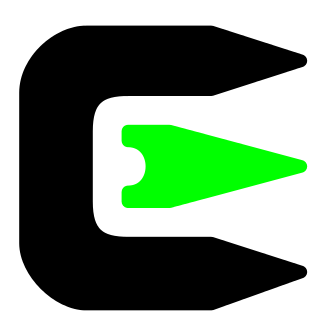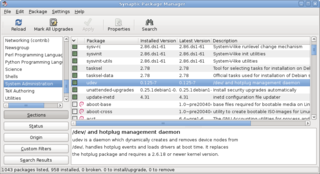
Cygwin is a POSIX-compatible environment that runs natively on Microsoft Windows. Its goal is to allow programs of Unix-like systems to be recompiled and run natively on Windows with minimal source code modifications by providing them with the same underlying POSIX API they would expect in those systems.

A Linux distribution is an operating system made from a software collection, which is based upon the Linux kernel and, often, a package management system. Linux users usually obtain their operating system by downloading one of the Linux distributions, which are available for a wide variety of systems ranging from embedded devices and personal computers to powerful supercomputers.

The Apache License is a permissive free software license written by the Apache Software Foundation (ASF). It allows users to use the software for any purpose, to distribute it, to modify it, and to distribute modified versions of the software under the terms of the license, without concern for royalties. The ASF and its projects release their software products under the Apache License. The license is also used by many non-ASF projects.
Dependency hell is a colloquial term for the frustration of some software users who have installed software packages which have dependencies on specific versions of other software packages.
The GNU Core Utilities or coreutils is a package of GNU software containing reimplementations for many of the basic tools, such as cat, ls, and rm, which are used on Unix-like operating systems.

Free and open-source software (FOSS) is software that can be classified as both free software and open-source software. That is, anyone is freely licensed to use, copy, study, and change the software in any way, and the source code is openly shared so that people are encouraged to voluntarily improve the design of the software. This is in contrast to proprietary software, where the software is under restrictive copyright licensing and the source code is usually hidden from the users.

TrueOS is a Unix-like, server-oriented operating system built upon the most recent releases of FreeBSD-CURRENT. Up to 2018 it aimed to be easy to install by using a graphical installation program, and easy and ready-to-use immediately by providing KDE SC, Lumina, LXDE, MATE, or Xfce as the desktop environment. In June 2018 the developers announced, that TrueOS is now a core OS that provides a basis for other projects and thus doesn't include a graphical installer anymore. Graphical end-user-orientated OSes based on TrueOS are GhostBSD and Trident. TrueOS provides official binary Nvidia and Intel drivers for hardware acceleration and an optional 3D desktop interface through KWin, and Wine is ready-to-use for running Microsoft Windows software. TrueOS is able to run Linux software, in addition to FreeBSD Ports collection, and it has its own .txz package manager. TrueOS supports OpenZFS, and the installer offers disk encryption with geli.
A permissive software license, sometimes also called BSD-like or BSD-style license, is a free-software license with minimal requirements about how the software can be redistributed. Examples include the MIT License, BSD licenses, Apple Public Source License and Apache license. As of 2016, the most popular free-software license is the permissive MIT license.
Tivoization is the creation of a system that incorporates software under the terms of a copyleft software license, but uses hardware restrictions to prevent users from running modified versions of the software on that hardware. Richard Stallman coined the term in reference to TiVo's use of GNU GPL licensed software on the TiVo brand digital video recorders (DVR), which actively blocks users from running modified software on its hardware by design. Stallman believes this practice denies users some of the freedom that the GNU General Public License was designed to protect. The Free Software Foundation refers to tivoized hardware as "tyrant devices".
This is a comparison of free and open-source software licenses. The comparison only covers software licenses with a linked article for details, approved by at least one expert group at the FSF, the OSI, the Debian project or the Fedora project. For a list of licenses not specifically intended for software, see List of free content licenses.
The Ruby License is a Free and Open Source license applied to the Ruby programming language and also available to be used in other projects. It is approved by the Free Software Foundation although it has not been approved Open Source by the Open Source Initiative.
License proliferation is the phenomenon of an abundance of already existing and the continued creation of new software licenses for software and software packages in the FOSS ecosystem. License proliferation affects the whole FOSS ecosystem negatively by the burden of increasingly complex license selection, license interaction, and license compatibility considerations.
License compatibility is a legal framework that allows for pieces of software with different software licenses to be distributed together. The need for such a framework arises because the different licenses can contain contradictory requirements, rendering it impossible to legally combine source code from separately-licensed software in order to create and publish a new program.

Foresight Linux was a Linux distribution comprising free and proprietary software with the goal of showcasing the latest in Linux desktop technologies. Foresight is developed by the Foresight community and is based on rPath, it also follows a rolling release cycle, instead of a time-based release schedule.

A free-software license is a notice that grants the recipient of a piece of software extensive rights to modify and redistribute that software. These actions are usually prohibited by copyright law, but the rights-holder of a piece of software can remove these restrictions by accompanying the software with a software license which grants the recipient these rights. Software using such a license is free software as conferred by the copyright holder. Free-software licenses are applied to software in source code and also binary object-code form, as the copyright law recognizes both forms.

The GNU General Public License is a widely-used free software license, which guarantees end users the freedom to run, study, share and modify the software. The license was originally written by Richard Stallman of the Free Software Foundation (FSF) for the GNU Project, and grants the recipients of a computer program the rights of the Free Software Definition. The GPL is a copyleft license, which means that derivative work must be open-source and distributed under the same license terms. This is in distinction to permissive free software licenses, of which the BSD licenses and the MIT License are widely-used less-restrictive examples. GPL was the first copyleft license for general use.
Software relicensing is applied in open-source software development when software licenses of software modules are incompatible and are required to be compatible for a greater combined work. Licenses applied to software as copyrightable works, in source code as binary form, can contain contradictory clauses. These requirements can make it impossible to combine source code or content of several software works to create a new combined one.









